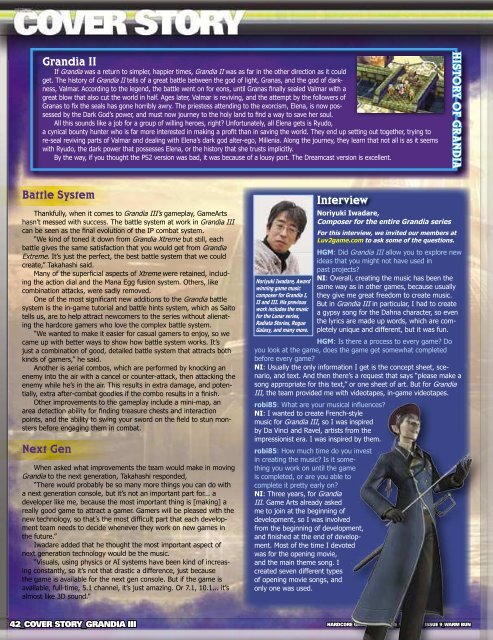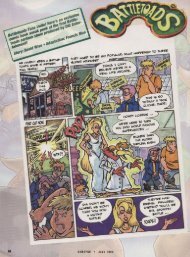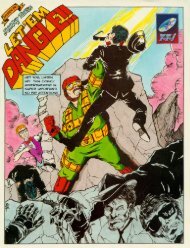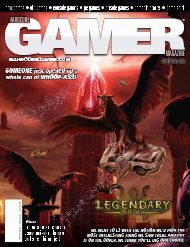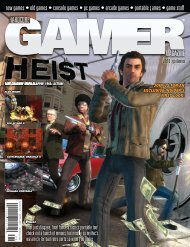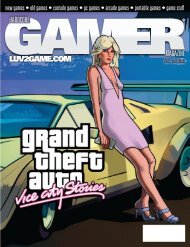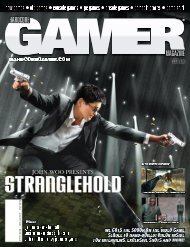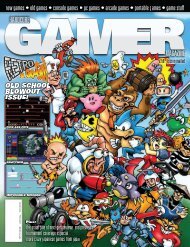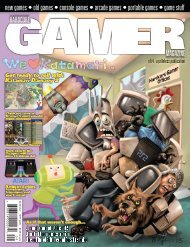Create successful ePaper yourself
Turn your PDF publications into a flip-book with our unique Google optimized e-Paper software.
Grandia II<br />
If Grandia was a return to simpler, happier times, Grandia II was as far in the other direction as it could<br />
get. The history of Grandia II tells of a great battle between the god of light, Granas, and the god of darkness,<br />
Valmar. According to the legend, the battle went on for eons, until Granas finally sealed Valmar with a<br />
great blow that also cut the world in half. Ages later, Valmar is reviving, and the attempt by the followers of<br />
Granas to fix the seals has gone horribly awry. The priestess attending to the exorcism, Elena, is now possessed<br />
by the Dark God’s power, and must now journey to the holy land to find a way to save her soul.<br />
All this sounds like a job for a group of willing heroes, right? Unfortunately, all Elena gets is Ryudo,<br />
a cynical bounty hunter who is far more interested in making a profit than in saving the world. They end up setting out together, trying to<br />
re-seal reviving parts of Valmar and dealing with Elena’s dark god alter-ego, Millenia. Along the journey, they learn that not all is as it seems<br />
with Ryudo, the dark power that possesses Elena, or the history that she trusts implicitly.<br />
By the way, if you thought the PS2 version was bad, it was because of a lousy port. The Dreamcast version is excellent.<br />
Battle System<br />
Thankfully, when it comes to Grandia III’s gameplay, GameArts<br />
hasn’t messed with success. The battle system at work in Grandia III<br />
can be seen as the final evolution of the IP combat system.<br />
“We kind of toned it down from Grandia Xtreme but still, each<br />
battle gives the same satisfaction that you would get from Grandia<br />
Extreme. It’s just the perfect, the best battle system that we could<br />
create,” Takahashi said.<br />
Many of the superficial aspects of Xtreme were retained, including<br />
the action dial and the Mana Egg fusion system. Others, like<br />
combination attacks, were sadly removed.<br />
One of the most significant new additions to the Grandia battle<br />
system is the in-game tutorial and battle hints system, which as Saito<br />
tells us, are to help attract newcomers to the series without alienating<br />
the hardcore gamers who love the complex battle system.<br />
“We wanted to make it easier for casual gamers to enjoy, so we<br />
came up with better ways to show how battle system works. It’s<br />
just a combination of good, detailed battle system that attracts both<br />
kinds of gamers,” he said.<br />
Another is aerial combos, which are performed by knocking an<br />
enemy into the air with a cancel or counter-attack, then attacking the<br />
enemy while he’s in the air. This results in extra damage, and potentially,<br />
extra after-combat goodies if the combo results in a finish.<br />
Other improvements to the gameplay include a mini-map, an<br />
area detection ability for finding treasure chests and interaction<br />
points, and the ability to swing your sword on the field to stun monsters<br />
before engaging them in combat.<br />
Next Gen<br />
When asked what improvements the team would make in moving<br />
Grandia to the next generation, Takahashi responded,<br />
“There would probably be so many more things you can do with<br />
a next generation console, but it’s not an important part for... a<br />
developer like me, because the most important thing is [making] a<br />
really good game to attract a gamer. Gamers will be pleased with the<br />
new technology, so that’s the most difficult part that each development<br />
team needs to decide whenever they work on new games in<br />
the future.”<br />
Iwadare added that he thought the most important aspect of<br />
next generation technology would be the music.<br />
“Visuals, using physics or AI systems have been kind of increasing<br />
constantly, so it’s not that drastic a difference, just because<br />
the game is available for the next gen console. But if the game is<br />
available, full-time, 5.1 channel, it’s just amazing. Or 7.1, 10.1... it’s<br />
almost like 3D sound.”<br />
Noriyuki Iwadare, Award<br />
winning game music<br />
composer for Grandia I,<br />
II and III. His previous<br />
work includes the music<br />
for the Lunar series,<br />
Radiata Stories, Rogue<br />
Galaxy, and many more.<br />
Interview<br />
Noriyuki Iwadare,<br />
Composer for the entire Grandia series<br />
For this interview, we invited our members at<br />
Luv2game.com to ask some of the questions.<br />
HISTORY OF GRANDIA<br />
HGM: Did Grandia III allow you to explore new<br />
ideas that you might not have used in<br />
past projects?<br />
NI: Overall, creating the music has been the<br />
same way as in other games, because usually<br />
they give me great freedom to create music.<br />
But in Grandia III in particular, I had to create<br />
a gypsy song for the Dahna character, so even<br />
the lyrics are made up words, which are completely<br />
unique and different, but it was fun.<br />
HGM: Is there a process to every game? Do<br />
you look at the game, does the game get somewhat completed<br />
before every game?<br />
NI: Usually the only information I get is the concept sheet, scenario,<br />
and text. And then there’s a request that says “please make a<br />
song appropriate for this text,” or one sheet of art. But for Grandia<br />
III, the team provided me with videotapes, in-game videotapes.<br />
robi85: What are your musical influences?<br />
NI: I wanted to create French-style<br />
music for Grandia III, so I was inspired<br />
by Da Vinci and Ravel, artists from the<br />
impressionist era. I was inspired by them.<br />
robi85: How much time do you invest<br />
in creating the music? Is it something<br />
you work on until the game<br />
is completed, or are you able to<br />
complete it pretty early on?<br />
NI: Three years, for Grandia<br />
III. Game Arts already asked<br />
me to join at the beginning of<br />
development, so I was involved<br />
from the beginning of development,<br />
and finished at the end of development.<br />
Most of the time I devoted<br />
was for the opening movie,<br />
and the main theme song. I<br />
created seven different types<br />
of opening movie songs, and<br />
only one was used.<br />
HGM: Did you get to use the other ones?<br />
NI: I wasn’t allowed to.<br />
DeathxFromxAbove & cheech79: How<br />
did you become a video game composer?<br />
Is that something you set out to do, or<br />
did you end up doing it maybe by chance?<br />
NI: I was just a keyboard player hoping to<br />
get a job in the music industry, and then<br />
one of my friends asked me out to get<br />
a job in the game industry, because my<br />
friend was already doing composing for<br />
games. That friend is still in the industry.<br />
HGM: For other musicians who would be<br />
interested in doing something like this,<br />
how would you recommend that they get<br />
started?<br />
NI: I get all these questions like that<br />
from people who come to my website,<br />
and what I always recommend is “read<br />
good books, so many books” and “see<br />
great art as much as possible” and always<br />
practice to translate those stories or art<br />
into music. Keep practicing that translation<br />
into the music. And another thing I<br />
should tell all these younger people is,<br />
recent game music composition is really<br />
tough and complicated, so study a lot.<br />
Imagination is the key. So what is the<br />
music for this situation, interviewing in<br />
the conference room? If you can’t think<br />
of the music, you can’t become a game<br />
composer.<br />
Angelous: We’ve been talking about how<br />
the Grandia series always has a theme.<br />
Is this true for the music as well, do you<br />
always find a theme for the music?<br />
NI: Actually, the theme song from<br />
Grandia through Xtreme was actually the<br />
same. For Grandia III we created a new<br />
one, but once again, I tried really hard<br />
to incorporate the humanity which is the<br />
basic theme of the game, so that through<br />
the music, people can feel accomplishment<br />
of finishing the game or trying new<br />
things. But on top of that I personally<br />
wanted to add encouragement to<br />
the gamers.<br />
I think that while I was creating this<br />
music for Grandia III, I was looking at the<br />
world, and Japan, too. There are so many<br />
people who cannot try new things or try<br />
them very actively. A lot of people are<br />
getting shy or being antisocial or being on<br />
their own towards the world, so I wanted<br />
to give those people encouragement, just<br />
give them one push to be out there and<br />
be active and be themselves.<br />
eternalblue81: What music do you like?<br />
NI: I listen to any type of music, but I<br />
like listening to music that’s really light<br />
and cheery.<br />
42_COVER STORY_GRANDIA III HARDCORE GAMER MAGAZINE_VOLUME 1_ISSUE 9_WARM BUN HARDCORE GAMER MAGAZINE_VOLUME 1_ISSUE 9_WARM BUN<br />
GRANDIA III_COVER STORY_43<br />
Review<br />
When playing Grandia III, a number of words come to mind.<br />
The first is “gorgeous.” The soft, hand-keyed style of Grandia III really gives us the best of<br />
both cartoonish and realistic styles. To say that the game looks like an anime would be doing it<br />
a disservice; anime hasn’t looked this good in fifteen years, assuming, that is, that it ever did.<br />
While the cutscenes do run long at times, they’re so amazingly well-animated, and so skillfully<br />
directed, that they could only be brought down by horrible voice acting. Fortunately, though<br />
they can be a bit dry at times, the voice actors (with a single painful, tone-breaking exception)<br />
actually seem to know what they’re doing. No scrambling for the mute button this time around,<br />
unless you just absolutely cannot stand dubs.<br />
The second is “streamlined.” In terms of gameplay, Grandia III gives you the essentials you<br />
need to get through the story quickly and efficiently. The camera has been improved greatly,<br />
and an area-scan ability and mini-map means no more struggling through endlessly confusing<br />
tunnels. Towns are smaller, with fewer places to explore, and fewer talk-heavy sidequests.<br />
Skills power up based on how much you use them in combat, eliminating tedious points-spending<br />
in the field, and the dungeon crawling:town:cut scene ratio feels just perfectly fine-tuned.<br />
Best of all, there’s only one minigame, and it’s one that you’re not even required to play. Ever.<br />
“Exhilarating” is another word, and it describes the combat system to a T. This really is<br />
the final evolution of the IP system introduced in the first Grandia. All the classic concerns for<br />
distance, speed, and timing are still there, but combat is now faster and weightier, avoiding the<br />
trap of tedious “lay down the controller and wait”-style ability animations in favor of a system<br />
where you’re really rewarded for strategy instead of skill-mashing. Each character not only<br />
has different skill sets, but actually moves differently in combat, meaning that a great deal of<br />
your combat success will come from learning your individual characters, not the system around<br />
them. Also, having a character who is a sniper actually means something in this game.<br />
The word “innocent” comes to mind regarding Grandia III’s plot. Its plucky, never-say-die<br />
heroes and almost naively black-and-white views of good and evil are a refreshing callback to<br />
the original after the overly dark and murky Grandia II. The fact that the mother-child relationship<br />
is dealt with actively through the early part of the adventure creates a set of character<br />
conflicts and themes rarely seen in a genre where protagonists are so often orphans, and it<br />
gives real weight to Yuki’s coming-of-age tale. His sincere desire to protect Alfina from the<br />
beginning (rather than trying to make them a classic “bickering couple that doesn’t realize<br />
they’re in love”) is also refreshing; if the game has any twists at all, it’s only in its complete<br />
lack of twists.


